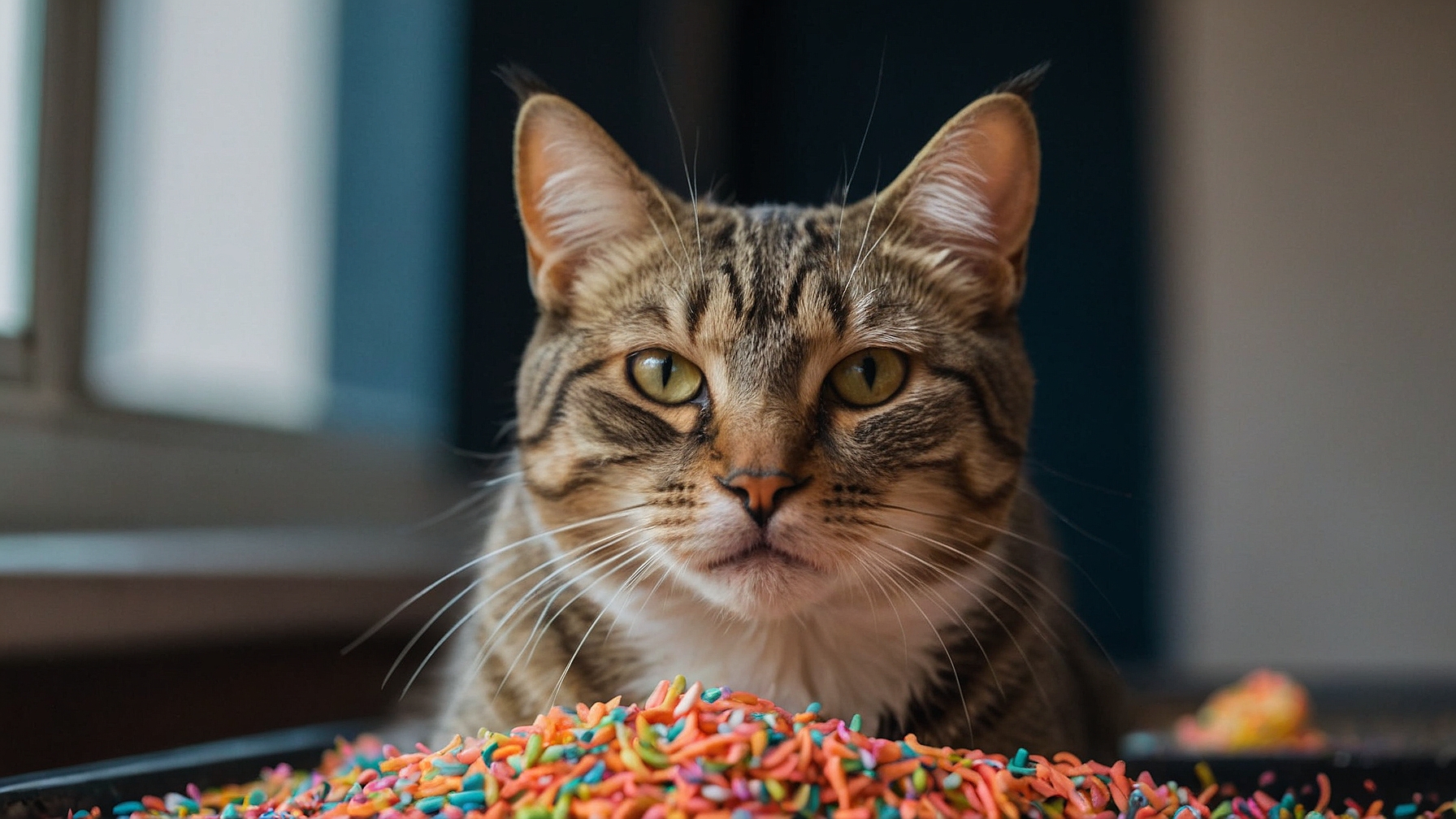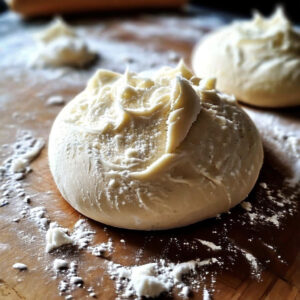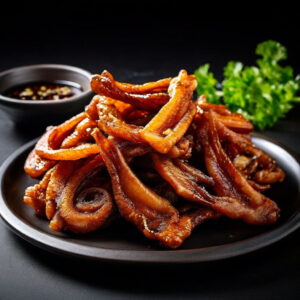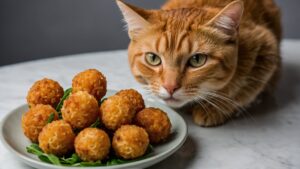Have you ever caught your cat trying to sneak a taste of sprinkles from the pantry? With their bright colors and sweet taste, sprinkles can seem like an appealing treat to cats. But are sprinkles actually safe for cats to eat? This comprehensive guide will cover everything you need to know about cats and sprinkles.
I’ll never forget the time I was baking cupcakes and turned around to see my cat, Ollie, pawing at the container of rainbow sprinkles. Before I could stop him, he had stuck his entire face in the jar!
This got me wondering—can cats eat sprinkles? Would those colorful candies actually be toxic to cats? Or harmless?
As a cat owner, it’s important to understand what human foods may pose a risk before sharing a tasty morsel with your feline friend. In this article, we’ll explore:
- Are sprinkles toxic for cats?
- Dangers of feeding sprinkles to cats
- Signs your cat may have eaten sprinkles
- What to do if your cat eats sprinkles
- Safer treat alternatives for cats
After reading this guide, you’ll know whether or not sprinkles are actually cat-safe, and what potential risks they may pose to cats if consumed. Let’s dive in!
Table of Contents
Can Cats Eat Sprinkles?
The first question we need to address—are sprinkles bad for cats? The short answer is yes, sprinkles can absolutely be toxic and harmful if eaten by cats. Here’s why:
Sprinkles Contain Ingredients Harmful to Cats
Sprinkles are made from sugar, artificial colors, and artificial flavors. Let’s look at how each of these ingredients can negatively impact cats:
- Sugar: Sprinkles contain high amounts of added sugar, which can cause feline obesity, diabetes, and dental issues if over-consumed. Cats did not evolve to process sugary foods.
- Artificial colors: Dyes like Red 40 or Yellow 5 are used to give sprinkles their vibrant color. But these food colorings can cause allergic reactions in cats.
- Artificial flavors: Fake fruit flavors or other artificial flavors are used to make sprinkles taste sweet. These added flavors may irritate your cat’s stomach.
Some specific ingredients found in some sprinkles should absolutely be avoided by cats:
- Xylitol: This sugar substitute used in “sugar-free” sprinkles is extremely toxic to cats. It can cause dangerous blood sugar crashes.
- Chocolate: Chocolate sprinkles would contain theobromine, which is poisonous to cats.
- Nuts: Sprinkles may contain ground nuts, which can trigger allergic reactions.
So in summary, the main ingredients in standard sprinkles offer no nutritional value for cats and can pose serious health risks. Cats should never be given sprinkles.
Dangers of Feeding Sprinkles to Cats
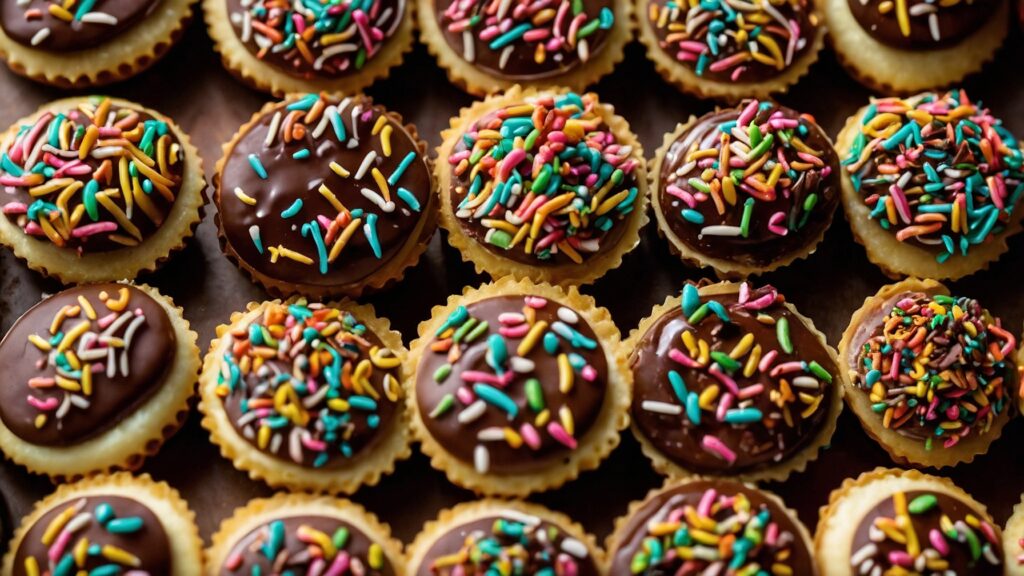
Now that we’ve established sprinkles are unsafe for cats, let’s look at some of the specific dangers cats face when ingesting sprinkles:
Obesity & Diabetes
The high sugar content of sprinkles can cause feline obesity if over-consumed. Obesity then puts cats at risk for diabetes, heart disease, arthritis and other problems. Just a teaspoon of sprinkles can contain up to 4 grams of sugar. The sugar spike can also cause hyperactivity in some cats.
Allergic Reactions
Cats may be allergic to the artificial coloring or flavoring in sprinkles. Reactions can include:
- Itchy skin or ears
- Hives or rash
- Swelling of face/muzzle
- Vomiting/diarrhea
- Trouble breathing
See the table below for common allergy symptoms in cats. If your cat has eaten sprinkles and develops any reaction, call your vet immediately.
Choking Hazard
The small, hard texture of sprinkles poses a choking risk for cats. Cats could choke on sprinkles lodged in their throat or aspirate sprinkles into their lungs. This can lead to coughing, gagging, difficulty breathing, and even death if left untreated.
Lack of Nutrition
Sprinkles offer no protein, vitamins or nutrients needed in a cat’s diet. Feeding sprinkles instead of a balanced cat food can lead to nutritional deficiencies over time.
The table below summarizes the main dangers sprinkles pose to cats:
| Danger | Symptoms |
|---|---|
| Obesity & Diabetes | Weight gain, increased appetite/thirst, lethargy |
| Allergic Reaction | Itchy skin, vomiting, swelling, trouble breathing |
| Choking Hazard | Coughing, gagging, trouble breathing |
| Nutritional Deficiency | Weight loss, lethargy, poor coat, illness |
As you can see, sprinkles offer no benefits at all and pose multiple health risks for cats. Now let’s look at how to recognize if your cat has eaten sprinkles.
Signs Your Cat May Have Eaten Sprinkles
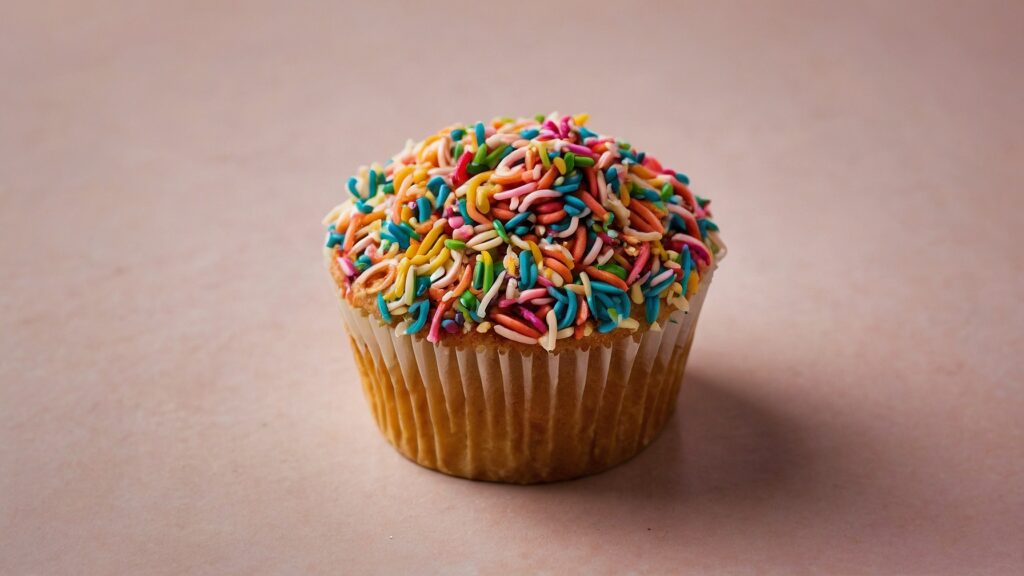
If you suspect your cat has nibbled on or consumed sprinkles, watch for any of these signs of a reaction:
- Hyperactivity or strange behavior – The sugar content may cause hyperactivity, anxiety, or agitation. Cats may seem wired or act strangely.
- Vomiting or diarrhea – Allergic or sensitive cats may vomit or have diarrhea after eating sprinkles.
- Loss of appetite – Your cat refuses food or treats after ingesting sprinkles.
- Lethargy – Lying around more than normal may signal an allergic reaction or upset stomach.
- Itchy skin, rash, swelling – Allergy symptoms like itchy ears, hives, or swelling around the muzzle.
- Coughing or gagging – Potential sign your cat is choking on sprinkles lodged in throat.
- Difficulty breathing – May indicate allergy reaction or that sprinkles have aspirated into lungs. Requires immediate vet attention!
Monitor your cat closely for at least 2 hours after potential sprinkle ingestion. Look for any of these symptoms arising. If you notice multiple or concerning reactions, contact your vet right away. Catching an issue early can prevent a small treat from becoming an emergency.
What to Do If Your Cat Eats Sprinkles
If you catch your cat eating sprinkles or see signs of a reaction afterwards, here are the steps to take:
Remain Calm
Cats can sense human panic or stress. Stay composed so you can calmly monitor your cat.
Check for Choking
Look for gagging, coughing, pawing at the mouth. Listen for troubled or noisy breathing. If choking is occurring, perform feline choking first aid immediately.
Watch for Symptoms
Continuously monitor your cat for at least 2 hours. Watch for reactions like vomiting, diarrhea, hyperactivity or lethargy.
Contact Your Vet
Call your vet for guidance, especially if concerning symptoms develop. They may recommend bringing your cat in for examination.
Induce Vomiting
If instructed by your vet, induce vomiting by giving your cat a small amount of 3% hydrogen peroxide. This may help eliminate sprinkles before absorbed.
Provide Details
Inform the vet about the approximate number of sprinkles eaten, when it occurred, ingredients if known, and any symptoms arising.
With prompt action, your vet can provide supportive care to treat any reaction and help your cat recover. Now let’s look at some healthier treat alternatives.
Safer Treat Alternatives for Cats
Rather than sprinkles, reward your cat with treats made specially for feline diets and digestive systems:
Healthy Treats
- Meat: Small pieces of cooked chicken, turkey, beef, or fish (ensure no seasonings or bones)
- Cheese: Low-fat cottage cheese or plain shredded cheese
- Veggies: Steamed broccoli, carrots, green beans
- Fruits: Small pieces of banana or blueberries (just a few!)
Commercial Cat Treats
- Freeze-dried meat: Pure bites of fish, chicken, liver, etc.
- Crunchy treats: Look for grain-free options with minimal ingredients
- Catnip: This minty herb is safe for most cats and provides enrichment
Avoid giving cats any sugary human foods like cake, candy, or ice cream. Focus on providing balanced cat food for meals and healthy treats in moderation.
Frequently Asked Questions
Still have questions about cats and sprinkles? Here are answers to some common queries:
Can kittens eat sprinkles?
No, kittens should never eat sprinkles. Their small size makes them even more vulnerable to choking. And they require balanced nutrition to support healthy growth.
What about sugar-free or chocolate sprinkles?
Neither of these are safe! Sugar-free varieties may contain xylitol which is toxic for cats. And chocolate contains unsafe theobromine.
Will just a few sprinkles hurt my cat?
It’s best to avoid sprinkles entirely. Even a small amount poses a choking risk and provides zero nutrition. Don’t start the habit of sharing sprinkles.
Can I bake cat treats with sprinkles?
No, never purposefully add sprinkles to food for your cat. Opt for cat-safe mix-ins like tuna, catnip, chicken, or cheese.
Do sprinkles have a different name?
Sprinkles are also known as jimmies, jojo’s, nonpareils, and 100s and 1000s based on their size. Avoid all of these decorative candies.
Still in doubt about the safety of sprinkles for cats? Consult with your veterinarian.
Conclusion
While the bright colors and fun shapes of sprinkles may attract your cat, these sugary cake decorations are unsafe and unhealthy for cats to consume.
Sprinkles contain ingredients like sugar, artificial colors, and chocolate that can cause obesity, allergies, and toxicity in cats. The small size also poses a choking hazard if inhaled into your cat’s airways.
So remember—resist the temptation to share sprinkles with cats. Skip the sprinkles and provide more wholesome treats like meat, cheese and catnip instead. Train your cat not to ingest human foods, and keep harmful items like sprinkles safely stored away.
Monitor your cat closely if they’ve eaten sprinkles and call your vet if any concerning symptoms develop. With your diligence, your feline friend will remain happy and healthy while enjoying cat-appropriate snacks!
